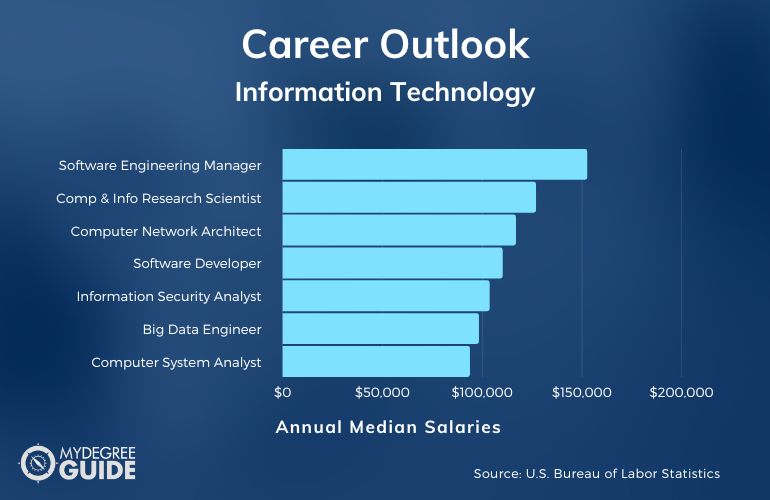Information technology (IT) is a dynamic, fast-growing field, and an online information technology degree can help you take advantage of the boom.

Editorial Listing ShortCode:
There are jobs opening up in just about every industry, and with some salaries reaching as much as $208,000 per year (Bureau of Labor Statistics), they can be quite profitable.
Universities Offering Information Technology Online Bachelor’s Degree Programs
Methodology: The following school list is in alphabetical order. To be included, a college or university must be regionally accredited and offer degree programs online or in a hybrid format.
1. American Intercontinental University
With campuses in Atlanta and Houston, American Intercontinental University moves past the boundaries of traditional education by also providing a private, first-class online educational system.
Opening in 1970, AIU has degree programs that range from associate to master’s and is rooted in a theory-based approach to higher learning. AIU is a leader in student-centered global education.
- BS in Information Technology
American InterContinental University is accredited by the Higher Learning Commission.
2. American Public University
American Public University has been helping military members, and veterans receive a higher education since 1919. This private college is now open to anyone seeking career advancement or learning opportunities that lead to undergraduate or graduate degrees.
As an online institution, American Public University provides options for busy adults around the world.
- BS in Information Technology
APUS is accredited by the Higher Learning Commission.
3. Arizona State University
Opening in 1886, Arizona State University sets a high standard for other public schools to follow. It exceeds expectations in research and program developments by helping students learn to civic-minded leaders among some of the most respected organizations. ASU has undergraduate and graduate programs in a diverse assortment of areas.
- BS in Information Technology
Arizona State University is accredited by the Higher Learning Commission of the North Central Association of Schools and Colleges.
4. Bellevue University
Bellevue University commenced in 1966 as a leader in online public education. Known for working closely with military members and veterans, BU allows students flexible options for acquiring their education from any place in the world.
Offering many areas of study, Bellevue University has a way for students to earn their bachelorette degree, master’s, or doctoral.
- BS in Information Technology
Bellevue University is accredited by the Higher Learning Commission.
5. California Baptist University
As an all-inclusive Christian school, California Baptist University is a private institution that started in 1950. CBU brings the gospel to each of their degree programs that range from associate to PhDs. Students who want a challenging academic path that enables them to become proficient in their discipline need look no further than CBU.
- BS in Computer Information Technology
California Baptist University is accredited by the Accrediting Commission for Senior Colleges and Universities of the Western Association of Schools and Colleges.
6. Colorado Technical University
Providing adult education since 1965, Colorado Technical University allows students to gain a private education that focuses on making global connections through classroom and virtual learning possibilities.
Known for advancement in science, technology engineering, and math, Global Tech has a variety of undergrad, graduate, and doctoral programs to discover.
- BS in Information Technology
Colorado Technical University is accredited by the Higher Learning Commission.
7. DePaul University
DePaul University opened in 1898 in Chicago, Illinois, as a Roman Catholic school that provides instruction to a diverse population of students. As the nation’s largest private Catholic college, DePaul University has 120 undergraduates and more than 150 graduate programs that include doctoral programs in both online and traditional learning options.
- BS in Information Technology
DePaul University is accredited by the Higher Learning Commission.
8. Florida International University
Created in 1965, Florida International University’s public educational facility works with students and professors to use applied research in the areas of science, space, and health studies to produce comprehensive programs.
FIT works with students around the world through virtual learning and on-campus course that lead to bachelor’s and graduate degrees.
- BA in Information Technology
- BS in Information Technology
Florida International University is accredited by the Southern Association of Colleges and Schools Commission on Colleges.
9. Georgia Southern University
Georgia Southern University has been a national leader in public education since its establishment in 1906. Students attending GSU can choose from 140 academic disciplines to gain an undergraduate, graduate, or doctorate. GSU spreads across borders and into eighty-five nations worldwide using both online and in-person formats.
- Bachelor of Information Technology
Georgia Southern University is accredited by the Commission on Southern Association of Colleges and Schools Commission on Colleges.
10. Herzing University
Herzing University has been serving students looking to achieve professional and educational excellence in a private school format since 1965.
With degree programs that are offered entirely online, Herzing University has a number of undergraduates and graduate degree options that are filled with skills-based knowledge and competitive twenty-first-century initiatives.
- BS in Information Technology
Herzing University is accredited by the Higher Learning Commission.
11. Keiser University
Keiser University is one of the most recognized private schools in the Florida education system. Its size and dynamics five it a significant distinction for global education.
Keiser University offers a virtual platform for students who prefer a non-traditional way of earning one of its many undergrad or graduate degrees. Traditional students have several campuses options.
- BS in Information Technology Management
Keiser University is accredited by the Commission on Colleges of the Southern Association of Colleges and Schools.
12. Liberty University
As a global leader in experienced-based education, Liberty University opened in 1771 and has cultivated into a world-renowned public institution that proves a means for bettering the world with research and education.
Liberty has online and in-person undergrad, graduate, and doctorate degrees in a plethora of fields, inkling business, education, and health.
- BS in Information Technology
Liberty University is accredited by the Southern Association of Colleges and Schools Commission on Colleges.
13. New Mexico State University
Starting in 1888 as a leading public school, New Mexico State University has a variety of online and in-person courses that were developed to assist students in gaining the information needed to be leaders in their field.
With a variation of four-year degrees and higher, NMSU allows students to engage in fieldwork through community service, co-ops, and study abroad programs.
- Bachelor of Information and Communication Technology
NMSU is accredited by the Higher Learning Commission.
14. Northeastern University
Northeastern University is an institution for private education that began in 1898. Undergraduate and graduate programs at NU submerge students into professional experiences to help them gain a better understanding of the information needed to become an expert in their area of study.
Students attending their first two years at NU are required to live on campus.
- BS in Information Technology
15. Old Dominion University
Located in beautiful Norfolk, VA, Old Dominion University began in 1930. It has campus-based programs and self-paced online learning that involve rigor and practical experience that allows students to obtain a doctoral, master’s, and undergrad education in an assortment of study options.
Allocating technology and discovery to help with global issues is imperative at ODU.
- BSBA in Information Systems and Technology
Old Dominion University is accredited by the Southern Association of Colleges and Schools Commission on Colleges.
16. Pennsylvania State University – World Campus
With accelerated online program options that lead to a variety of two-year, four-year, master’s, and doctoral degrees, Pennsylvania State University World Campus has been offering public education options since 1998. Turning experience into college credit is a specialty of PSUWC.
It gives students who are experts in their field a chance to use their knowledge as college course credits.
- BS in Information Sciences and Technology
Penn State World Campus is regionally accredited by the Middle States Association of Colleges and Schools.
17. Regent University
Regent University was developed in the state of Virginia as a private, Christian school in 1977. Regent serves students across the globe using the latest in technology and innovations. With its campus and online locations, Regent can offer an array of degrees that range from two-year programs to professional doctoral programs.
- BS in Information Systems Technology
Regent University is accredited by the Southern Association of Colleges and Schools Commission on Colleges.
18. Regis University
Regis University has been providing a private Jesuit based education since it began in 1877. RU opens its doors to students of all religions to gain an undergraduate or graduate degree. With both virtual and in-person formats, Regis University endeavors to ensure each student has access to applied learning strategies.
- BS in Information Technology
Regis University is accredited by the Higher Learning Commission.
19. University of Cincinnati
Created in 1819, the University of Cincinnati underwent several name changes as it progressed into the public-school powerhouse it is today.
With hundreds of academic programs that allow students to attain graduate and undergraduate degrees, the University of Cincinnati strives to influence many students around the world through distance education and campus-based learning.
- BS in Information Technology
The University of Cincinnati is accredited by the Higher Learning Commission.
20. University of Massachusetts – Lowell
The University of Massachusetts – Lowell started as a small public school in 1894 and now enrolls more than 15,000 individuals yearly. UMass-Lowell provides student-centered learning opportunities to anyone who is seeking one of its lucrative undergraduate or graduate degrees.
This university prevails in a variety of areas, including science, health studies, and nuclear engineering.
- BS in Information Technology
The University of Massachusetts Lowell is accredited by the New England Commission of Higher Education.
21. University of the Cumberlands
The University of the Cumberlands is one of the most affordable public education institutions in the region. It has not only been giving students access to high education since 1888, but the University of the Cumberlands also offers students free textbooks.
Offering degrees that range from associate to doctoral, this school strives to meet the needs of all who attend.
- Bachelor’s in Information Technology
The University of the Cumberlands is accredited by the Southern Association of Colleges and Schools Commission on Colleges.
22. University of Wisconsin – Stout
Offering more than sixty academic programs that allow students to earn a doctorate, master’s, or bachelor’s degrees, the University of Wisconsin – Stout uses practical experiences, and subject awareness within each instruction are offered.
Opening to the public in 1891, the university now serves thousands of students with campus-based and online learning throughout the world.
- BS in Information and Communication Technologies
The University of Wisconsin-Stout is accredited by the Higher Learning Commission of the North Central Association of Colleges & Schools.
23. Western Governors University
Western Governors University opened its door in 1997, offering self-paced degree options for busy adults looking to acquire a master’s or bachelor’s degree in a variety of disciplines. WGU has a cutting-edge distance-learning program that shows students a private education can change and meet the needs of the ever-changing society.
- BS in Information Technology
Western Governors University is accredited by the Northwest Commission on Colleges and Universities.
24. Western Kentucky University
Created in 1906 to assist adults advance in personal and professional development, Western Kentucky University now reaches thousands annually and offers a vast array of course studies. Students who gain a bachelor’s or master’s degree from WKU have the knowledge to compete in the global economy.
- BS in Computer Information Technology
Western Kentucky University is accredited by the Southern Association of Colleges and Schools Commission on Colleges.
Online Information Technology Degrees
A good education can be a critical component in your success as an IT professional. Many jobs will require a bachelor’s degree in information technology at the very minimum, and specialized, high-paying careers can require advanced degrees and certificates.
In some cases, even if these qualifications aren’t required, they’ll be expected. Job applicants need to stay competitive in their markets.
Select the program that most interests you to jump to that section of the guide:
The good news is that there are many options to choose from when going to school for an IT degree.
Information Technology – no specialty

This is the generalist version of an information technology degree. Rather than concentrating your studies on a specific area to land a specific job, you can learn a diverse range of skills that can be applied to many different industries.
These degree programs are designed to teach students the basics of both software and hardware. Students familiarize themselves with computers, operating systems, programming languages and data-based networks. Typical courses also include studies on algorithms and the other building blocks of modern information systems.
Editorial Listing ShortCode:
If you aren’t sure what to study, or if you want a flexible, multidisciplinary degree that can take you down many different career paths, consider a general IT degree. If you know IT is for you and you want to advance your degree to the next level, consider pursuing an online master’s degree in information technology or even an online PhD in information technology.
Computer Programming

Programming is the language of computers. Every time that you hit a key, you’re deploying a program that someone wrote for that specific task or function. You’re talking to your computer, and it’s talking back.
Programming languages include Java, Python, C++, Ruby, and Swift. You can master one or two, or you can become a polyglot who’s able to troubleshoot in multiple programming languages.
Editorial Listing ShortCode:
Most IT degrees will require programming classes, but if you choose it as a specialization, you’ll make it your primary area of study. This can be a smart decision if you already know that you’re interested in a career as a coder, web developer, software engineer or network architect.
All of these occupations will need fluency in the language of computers, and a programming specialization is where you can learn it.
Cyber Security

Cyber security is a diverse field. In fact, it’s so diverse that it can be offered as its own major, or it can be presented with sub-specialties like cryptology, big data, and information system management.
If you’re interested in cyber security, you’ll need to be prepared for fast-paced work in an ever-changing field. New developments are made every day; new threats are discovered every day. Cyber security students have to be adaptive to rapidly evolving circumstances.
Editorial Listing ShortCode:
If you’re up to the challenge, however, cyber security can be a very lucrative field. According to the Bureau of Labor Statistics, experts can potentially earn between $60,060 – $163,300 per year, and the average is $103,590. The best-paying fields are in finance, insurance and computer systems design.
Data Analytics

Data analytics is the study of data. Since digitized information is one of the building blocks of IT, there’s a booming industry around how it’s collected, stored, mined, organized, tracked and assessed.
The most obvious path for data analytics students is to become a data analyst. However, there are plenty of other jobs available. You might become a software engineer who builds tools for data management; you might become a network or systems architect with a focus in data storage, retrieval or assessment.
Editorial Listing ShortCode:
Don’t feel like you’re limited by the “analyzing” part of data analytics. It’s a specialization that can take you into many different careers.
Database Management

Database management is a bit like data analytics in the sense that it’s concerned with how information is stored, managed, and interpreted. However, it’s focused on the information within databases rather than information found on any computerized system.
Students of database management should be prepared to enter a multidisciplinary field of study. It can involve everything from statistical models to computer programming languages, so it’s very wide-ranging.
Editorial Listing ShortCode:
The good news is that its versatility also makes it ideal for entering different industries. Database management has applications in everything from retail sales to public health administration, so you should have plenty of job options after graduation.
Digital Forensics

Also known as computer forensics or digital forensic science, this field of study is focused on the investigation of devices, databases, networks, and information systems. It’s often but not always related to computer crime.
There are several sub-specialties for digital forensics, including:
- Computer forensics
- Network forensics
- Mobile device forensics
Editorial Listing ShortCode:
As you can see, these disciplines are devoted to different information systems. Retrieving data from a smartphone isn’t the same as getting it from a thumb drive or memory card, so digital forensics students usually choose a concentration for their studies. It’s the best way to fulfill a niche in the cyber security job market.
Health Information Management

Many information technology jobs are centered on business and tech, but they’re far from the only ones out there. The healthcare industry also has a growing need for IT professionals as things like patient records and insurance claims become more and more digitized.
Health information management is a field of study that focuses on healthcare data. How can it be stored? What are the quickest and safest ways to transfer it? What trends and statistics can be learned from analyzing it?
Editorial Listing ShortCode:
A specialized degree in health information management (HIM) can qualify you for many jobs in human services and healthcare administration. If you’re a detail-oriented person who doesn’t mind working behind the scenes, this could be the academic track for you.
Information Systems Security

Information systems security is more commonly known as INFOSEC. It’s dedicated to the protection of sensitive or confidential data, and it has close ties with cyber security, information assurance, and business intelligence. You’ll see a lot of crossover with these terms in college degree programs.
What can you do with an INFOSEC degree? It depends on your interests. Most fields have a demand for information security, so whether you’re considering a career in sales, economics, healthcare, law, or government, you can probably find a job for an INFOSEC specialist.
Editorial Listing ShortCode:
It’ll be up to you whether to concentrate your studies on a specific area of digital security or to become a “jack of all trades” who does it all.
Management Information Systems

Another generalist field of study, management information systems (MIS) can teach you a wide range of subjects relating to information systems and how they work.
Some people use MIS to refer to specific pieces of software that collect and organize data for businesses. Others use it as a catch-all term for any kind of information or technology devoted to data management.
Editorial Listing ShortCode:
Ask your school about their programs for management information systems. They might offer it as a major or minor, or they might have a certification exam for professionals. University programs for MIS can be just as varied as the subject itself.
Network Administration

Network administration degrees are focused on the development and operation of computer networks. They can be earned at every level of education.
Editorial Listing ShortCode:
An associate degree can prepare you for entry-level jobs like assistant network administrator. A bachelor’s or master’s can qualify you for higher positions like network engineer or network architect. A doctorate can set you up for academic or research-based positions as a PhD holder in network administration.
Software Engineering Management

You may be familiar with the concept of software engineering, but what about software engineering management?
In simple terms, it’s dedicated to leadership in the software industry. It’s a degree that can prepare you for roles like manager, director, supervisor, and CEO. Instead of developing or distributing your own software, you can oversee the people who do.
Editorial Listing ShortCode:
Software engineering managers can potentially make upwards of $152,480 per year (Bureau of Labor Statistics), so it can be a profitable line of work. However, it isn’t one that you can enter straight out of college as you’ll need both education and experience to work your way up the ladder, so consider this a long-term career goal.
Web Development

Web development is one of the more creative jobs in information technology. Despite its name, it isn’t limited to websites; you could also find yourself developing apps, games, mobile platforms and other interesting things that run on web power.
Salaries can often be quite high. While the average is $77,200 per year, the top earners in the field take home almost double that: $146,430 per year (Bureau of Labor Statistics).
Editorial Listing ShortCode:
Another great thing about web development is that you can get started with an associate degree or less, so if you don’t want to wait four years to be employable, it’s an industry where you can get to work right away.
Information Technology Curriculum & Courses

What will you study as an IT major? While it ultimately depends on your areas of interest, here are a few classes that you might see on a course list:
- Data Analytics: Data is the beating heart of information systems, and analytics are used to study, track, collect, organize, and interpret it.
- Cyber Security: As the web grows, so does the need for cyber security. These classes can teach you how to defend data from hacks and attacks.
- Network Systems Administration: You might be offered several classes in network administration. They can teach you how to build them as well as how to support, protect, and troubleshoot them.
- Computer Programming: There are hundreds of programming languages out there, and each one has its own unique applications in information technology.
- Operating Systems: Operating systems go beyond Windows and Macs. They’re an entire specialty in information technology, and they require study to master.
- Web Design and Development: Web design is a valuable skill on the job market, so even if you don’t have plans to become a web developer, it can pay to learn about these tools and technologies.
- Cloud Computing: Cloud computing is a growing demand in the world of IT, and these classes can familiarize you with its development and infrastructure.
- Leadership: If your career goals include the word “manager” or “director,” you might benefit from leadership courses that are focused on things like organization, human behavior, and resource management.
If you’re specializing, you should expect to add degree-specific classes to your schedule as well. For example, a computer information technology degree might require extra classes in computer science.
Information Technology Careers & Salaries

According to the U.S. Bureau of Labor Statistics, the average salary for computer and information technology professionals is $91,250. The industry is expected to grow by 11 percent in the next decade and add more than 531,000 jobs in total.
As for the jobs themselves, they’ll vary. Many computer careers will put you behind a desk, but there are some that have hands-on elements. There can also be a client or customer service aspect if you take on a business position.
Here are just a few careers that you might consider with a degree in information technology:
| Careers |
Annual Median Salary |
| Software Engineering Manager |
$152,480 |
| Computer and Information Research Scientist |
$126,830 |
| Computer Network Architect |
$116,780 |
| Software Developer |
$110,140 |
| Information Security Analyst |
$103,590 |
| Big Data Engineer |
$98,230 |
| Computer System Analyst |
$93,730 |
| University Computer Science Professor |
$85,540 |
| Network and Computer Systems Administrator |
$84,810 |
| Computer Network Support Specialist |
$65,450 |
Keep in mind that these are average salaries, so they don’t represent the highest or lowest amounts that you might make. For example, information systems managers take home an average of $151,150 per year, but their full range is $90,430 – $208,000 per year.
When researching a potential information technology degree salary, make sure to look at the total pay scale and not just the median.
Accreditation

Accreditation is an important feature for colleges. In simple terms, it proves that they’ve met the educational standards set forth by the U.S. Department of Education, and it verifies them as reputable, non-scam schools. It also qualifies them for federal financial aid like FAFSA.
Some colleges aren’t accredited. Since it’s a voluntary process, they can choose not to apply for it.
However, students who graduate from an unaccredited college run the risk of having a “paper” degree that isn’t recognized by employers, licensing agencies, and other professional institutions.
They can also face challenges if they ever need to transfer credits between schools. Accredited colleges don’t usually accept coursework from unaccredited ones.
There are three types of accreditation:
- Regional accreditation
- National accreditation
- Programmatic accreditation
All three types are legitimate, but they’re issued by different accrediting boards, and they have different standards and practices between them. Check out the Council for Higher Education Accreditation (CHEA) to learn more.
Information Technology Professional Organizations

Professional organizations can be a valuable resource for both students and working folks. In exchange for an annual membership fee, you can get access to things like conferences, newsletters, job listings, and learning materials.
You’ll also be connected to an entire network of professionals that can offer everything from career advice to technical support.
Here are just a few groups that might interest you if you’re working on an information technology online degree:
- Association for Computing Machinery – As the world’s largest society for computer science, the ACM has almost 100,000 members globally, and it offers many resources that include a digital library and online learning center.
- Association for Information Science and Technology – ASIS&T is devoted to all forms of information science, and it offers conferences, communities, leadership programs, special interest groups and more. It even has different tiers of memberships for students, recent graduates, and early professionals.
- Association of Software Professionals – ASP is for anyone interested in software, and it boasts a thriving discussion portal as well as membership discounts on products, services, and multimedia tools for the industry.
- Computing Technology Industry Association – Considered one of the top trade associations for information technology, CompTIA offers training, testing, certifications, and continuing education classes for students and professionals alike. It’s the place to take exams for things like cyber security and cloud computing.
- Information Technology Alliance – The ITA is a supportive network of information technology professionals who hold regular meetings, conferences, roundtables, seminars and other valuable events.
- Information Technology Industry Council – Based in Washington, D.C., the ITIC is focused on policy and advocacy for information technology. It offers regular news, updates, and special events for its members.
- Network Professional Association – The NPA is for computer and technology professionals. It offers career building services as well as conferences, professional affiliations and leadership opportunities.
These are just a few groups for IT students and professionals. There are more, so don’t be afraid to reach out to an academic advisor and explore your networking options.
Information Technology Licensing and Certification

There are many licenses and certificates for IT professionals, and they can be a worthwhile complement to a bachelor degree in information technology. Not only can they improve your employment prospects, but they can also build your knowledge and skills in preparation for a higher degree.
Here are a few examples of the IT certifications that you can pursue. There are ultimately too many to list on a single page, but these are some of the most common.
- Cisco Internet Expert Certification – Cisco offers several certifications in networking, security, computer design, and data center systems. The Cisco Certified Internetwork Expert (CCIE) is one of the most prestigious, and it’s available with both an “infrastructure” and “wireless” focus.
- CompTIA Project+ Certification – This certification is for project managers, team leaders, and others who want to establish themselves as authoritative experts in technology.
- Certified Information Systems Security Professional Certification – Offered by the International Information System Security Certification Consortium, the CISSP will verify your knowledge in cyber security. It’s available with three different focus areas: architecture, engineering, and management.
- IT Architect Certification – Administered by the Open Group, this certification is for information technology professionals who want to build networks, databases, servers, and directories. It’s available on three levels that range from apprentice to master.
- ITIL Certification – If you’re familiar with the Information Technology Infrastructure Library (ITIL), you might benefit from an ITIL certification. There are five levels in total, including foundation, practitioner, intermediate, expert, and master.
- Microsoft Certified Solutions Developer Certification – The Microsoft Certified Solutions Developer (MCSD) is for students and professionals who have mastered a variety of IT skills and understand how to implement them in the field.
- Oracle DBA Professional Certification – Oracle offers several proficiency exams for database administration. You might need to take their classes or qualifying exams before you’re able to sit for the DBA exam.
- Six Sigma Certification – Are you a whiz at Six Sigma? Get certified with their yellow, green, and black belt qualifications to prove your competence with the systems.
These are just a few professional certifications that look good on your resume. There are dozens and dozens more, so don’t feel limited by the suggestions on this list. Whether you’re skilled at coding, networking, software engineering or cloud computing, you can find a certification for it.
Financial Aid

Do you need help paying for an online bachelor’s degree in information technology? You aren’t alone. Millions of students apply for financial aid each year.
The first step is filling out the Free Application for Federal Student Aid (FAFSA). It won’t cost you anything; it’ll just ask questions about your income, residency status, school choice, and other qualifying information.
Once your FAFSA has been processed, they’ll let you know if you’re eligible for financial aid. It could come in several different forms:
- Grants are essentially free money for college. They don’t have to be paid back, but there are restrictions and conditions for their use.
- Loans come in two types: subsidized and unsubsidized. With subsidized loans, the government will pay the interest while you’re in school. With unsubsidized loans, you’re responsible for the interest yourself.
- Work-study programs will allow you to work part-time jobs on campus to pay for college costs.
There are also financial aid opportunities outside of FAFSA. They include scholarships, private loans, and tuition reimbursement from your employer.
Scholarships

College scholarships can range from one-time payouts to recurring rewards that cover all four years of schooling. Despite what you might think, you don’t have to be an honor roll student to earn them. There are a wide range of scholarships available for all types of students who are seeking an information technology bachelor’s degree:
- AFCEA STEM Major Scholarships – Offered by the Armed Forces Communications and Electronics Association, these scholarships are for undergraduate students who are pursuing a degree in science, technology, mathematics, or engineering. You can submit a single application and be considered for several different scholarships under the STEM umbrella. Rewards range from $2,500 – $5,000.
- Betty Stevens Frecknall Scholarship – This scholarship offers $2,000 to information technology majors. You’ll need to be a full-time student with a 3.0 GPA to apply.
- Buildium Women in Technology Scholarship – Administered by Buildium, the Women in Technology scholarship is meant for female students in STEM degree programs. It awards $2,500 each semester to a new winner.
- Powerline Prodigies Scholarship – The Powerline Group gives $5,000 to two students who are pursuing technology, computer science, or software engineering degrees. One award is reserved for New York residents while the other is offered nationwide.
You can also find a number of scholarships that aren’t meant specifically for IT studies. For example, there are scholarships for low-income students regardless of their major.
What Is the Best Online College for Information Technology?

Choosing a college is a very personal process, so there’s no way for a stranger or even a family member or guidance counselor to make the right decision for you. You’ll need to figure it out on your own.
Decide for yourself how you want to prioritize things like tuition, accreditation, admission requirements, available classes, and faculty-to-student ratio.
Which Information Technology Degree Is Best?
While every degree program is different, there are a few hallmarks of a good one:
- Accreditation – The school has been regionally or nationally accredited, or the degree program has been vetted by a professional association specifically for information technology.
- Online accessibility – If you’re enrolling as a distance learner, you’ll want a well-developed online program with things like flexible scheduling and tech support.
- A variety of degrees and specializations – If you want to focus your studies on a particular branch of IT, make sure that it’s available as a major, minor, concentration, or certificate.
Remember that you aren’t looking for any old college. You’re looking for a reputable college where you can get an information technology degree online.
What Are the Degrees in Information Technology?

“Information technology” is available as a major at many accredited universities. There are also similar programs with different labels such as “information science,” “information systems” or just “informatics.”
You can earn either an Associate of Arts (AA) or Associate of Science (AS) in information technology. You can also earn a Bachelor of Arts (BA) or a Bachelor of Science (BS) in information technology.
At the graduate level, you can go for a Doctor of Philosophy (PhD) in Information Technology, or you can earn a specialized Doctor of Information Technology (DIT).
Is an IT Degree Worth It?
Yes, an IT degree is worth it for many students. The Bureau of Labor Statistics is projecting 11% job growth in computer and information technology occupations over the next 10 years. Common careers in this field include big data analyst, computer system analyst, software developer, and software engineering manager.
It’s a growing industry. More than 531,200 jobs are expected to be added in the next decade, so it’s on an upward trajectory. Your degree could help you find work in many different fields. Every business needs tech experts.
What’s the Difference Between an AS vs. AA Degree in Information Technology?

Functionally speaking, there’s little difference between an Associate of Arts (AA) and an Associate of Science (AS) degree. They’ll require many of the same classes, and there will be a lot of overlap between subjects, professors, projects, and study areas. The same goes for a Bachelor of Arts (BA) and Bachelor of Science (BS).
The difference lies in the amount of science- and math-based credits that you’ll need to graduate. With an Associate of Science, you might be required to take more technical credits than an Associate of Arts, or you might need to choose your credits from more technical categories to fulfill your major-specific requirements.
Overall, however, it’s unlikely to matter to employers whether you have an AA or AS. It’s just something to consider for yourself if you have an aptitude for STEM subjects.
What Can You Do With an Information Technology Degree?
An information technology degree can open many doors. While most people tend to think of IT careers in the context of tech support, there are many other possibilities in business, finance, communications, administration, and education. You could become a university professor; you could become a software developer or hardware engineer.
You could even become a creative professional with an IT background to help bring your imagination to life.
What Jobs Can You Get With an Bachelor’s Degree in Information Technology?

What are your options for information technology degree jobs? It depends on what you study.
If you’re good with numbers, for example, you might enjoy a data-heavy job in statistics or algorithms. You could also become a specialist in data mining, software engineering, or systems managing.
If you’re more of the creative type, you might become an app builder or website developer. These careers can allow you to join your artistic side with your technical skills.
Do you have a flair for business? Become a technology specialist at a Fortune 500 company. Do you prefer smaller projects? If so, you could loan yourself out as a consultant for start-ups and entrepreneurs.
The sky is the limit when it comes to IT jobs. Just about every industry has a demand for computer experts, and that demand is expected to grow as the world becomes increasingly digital.
How Long Does it Take to Get an Online Bachelor’s in Information Technology Degree?

It usually takes four years to earn a bachelor’s degree. Most IT programs will require 120 credits to graduate, and if you’re taking 15 credits per semester that equals four years of study:
- 15 credits per semester x 2 semesters per year x 4 years = 120 credits
You can speed up this process if you take summer semesters or higher credit loads per semester.
How Much Does an Online IT Degree Cost?
College tuition is usually calculated on a per-credit basis. Rather than charging you X amount of dollars per year, the school will charge you X amount per credit.
The price of a college credit can be anywhere from $300 – $1,000 each. This is why tuition rates vary wildly between schools. If they’re charging a lot per credit, that will equal a big tuition per year.
When calculating the price of your IT degree, take the school’s per-credit cost and multiply it by 120 credits. That’s the amount that you’ll need for most bachelor’s degrees.
What Is a Bachelor’s in Information Technology Degree?

A bachelor’s degree in information degree is a four-year degree. It is designed to teach you about computers, operating systems, programming languages, algorithms, data security and more.
Many IT jobs will ask for a bachelor’s degree at the minimum, so it’s a good starting point for your education.
What Is an IT manager?
An IT manager is usually in charge of a team or department. It’s a position of authority, so they need strong leadership and communication skills as well as technical knowledge in their field.
If you’re interested in becoming an IT manager, you can specialize in business management or information management while earning your IT degree. Some schools also offer an information technology management degree as a separate major.
Getting Your Information Technology Degree Online

Information technology is a lucrative field. Salaries can reach six figures per year, and the industry is growing at a rate that surpasses the national average. Thousands of new jobs are expected to be opening up in the next decade.
Now is a great time to get an information technology degree, and if you opt for online classes, as you would find in an online system administrator degree program, you can earn it without even stepping foot on a college campus.
